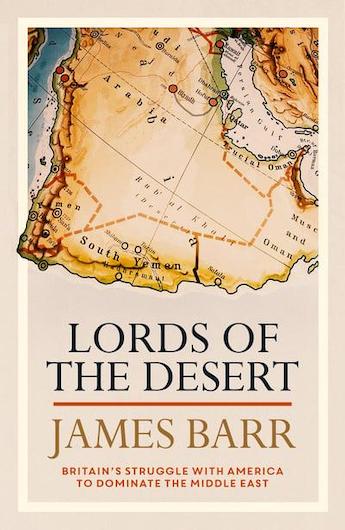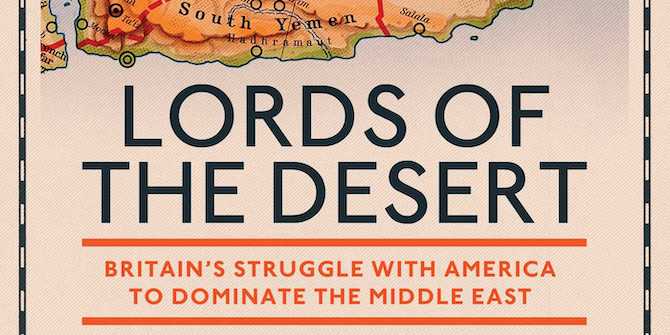by Jim Muir
James Barr has produced a worthy successor to ‘A Line in the Sand’, his masterly study of collusion, rivalry and skulduggery as the British and French wrestled to carve up the Middle East to their own benefit in the early decades of the 20th century. Here he carries forward the story, showing how the Americans, far from bowing out of the scene after the Second World War as Churchill expected and hoped, took over the French role as Britain’s rival-allies, competing to fill the vacuum as British power and the glories of empire faded.
As Barr skilfully documents in this compelling narrative, the British were painfully slow to understand, as WWII began drawing to an end, that the world was changing and that old imperial practices and attitudes simply could not live on for long in the new post-war era.
They had managed, after the First World War, to shrug off the US president Woodrow Wilson’s promotion of such revolutionary principles as self-determination and democracy for far-flung native peoples, as the US retreated into a period of isolationism and essentially left them and the French to get on carving up and effectively ruling the Middle East.
But there were several major and compelling new reasons why the Americans were not simply going to lose interest in the Middle East and go away after Hitler was defeated by the Allies in the 1940s. The region continued to matter to Washington, indeed increasingly so. To the irritation of the British, the US inevitably became increasingly embroiled in its affairs, leading to frequent bouts of friction, cross-purposes and sometimes outright animosity between the staunch wartime allies.
The writing was on the wall long before hostilities ended in 1945, but the British were reluctant to read it.
The emergence of Israel from the British-bungled wreckage of Palestine provided a huge incentive for the US to remain engaged, and frequently at odds with London: the Zionist cause rapidly gained ground among American Jews, who both numerically and financially could not be ignored by US politicians, as Barr illustrates in detail. In the mid-1940s there were four times as many Jews in New York as in Palestine. As Harry Truman put it, ‘I have to answer to hundreds of thousands who are serious for the success of Zionism. I do not have hundreds of thousands of Arabs among my constituents.’ With the British struggling to curb Jewish immigration into Palestine and US leaders urging an opening of the floodgates, feelings ran high.
The region’s countries may have had borders drawn decades earlier by the imperial powers, but the set-ups they sponsored, relying on cultivating local elites, were far from stable, and the future identity of virtually all the Arab states was the focus of chronic post-war struggles. The emergence of the Soviet Union as a global superpower actively propagating communism thus represented a massive challenge and threat to the Americans in the age of rampant McCarthyism. As the other superpower in a new bi-polar era, the US became obsessed with countering the ‘Soviet threat’. Its efforts to set up a protective ‘northern tier’ from Turkey to Pakistan collided with Britain’s view of itself as the natural authority to direct such a project, leading London to promote the ill-fated Baghdad Pact in the 1950s essentially in competition.
Probably the most significant example of this collision of optics was in Egypt, where Britain – and Churchill in particular – simply could not bring itself to let go, to the astonishment and dismay of the Americans, who had for years feared that they were being tarnished throughout the region by association with the UK’s imperial follies. To London’s horror, the CIA was involved in the 1952 Free Officers’ Movement which brought Neguib and ultimately Nasser to power, and Washington continued to have strong sympathy for Nasser in the ideological struggles that pervaded the region in the 1950s and 60s.
The ultimate folly, the collusive Israeli-French-British invasion of Sinai and Suez in 1956, brought differences to a dramatic head: unimaginable today, the British and French vetoed a US-sponsored withdrawal resolution at the UN Security Council, while Washington threatened economic sanctions on its headstrong European allies. They had to withdraw, tails between legs. They had entirely misjudged the US position, probably believing that Washington would be swayed by commitment to Israel. But Eisenhower and his secretary of State John Foster Dulles were much more concerned that embroilment in such an affair would be a gift horse to the Soviets. For once, Dulles could say it was ‘a miscalculation to think Jewish influence here is such as to assure US sympathy with such operations.’
As long as three years before the Suez fiasco Dulles, touring the Middle East, had discovered ‘an intense distrust and dislike for the British’ throughout the region. He concluded that the British troops still based there were a factor for instability, and that it was time for the US to ‘take charge of the situation and ease the British out’.
The importance of Middle East oil had been heavily underscored by the wartime demand for it, and British- and American-dominated companies (Anglo-Iranian, Iraqi, and the predecessor of Aramco) found themselves competing with one another while also contending with the rising demands of regional nationalism for a greater share of wealth and control. This provided yet another source of friction between the western allies.
Harold MacMillan, who followed as Prime Minister the doomed author of Suez Anthony Eden, might well lament that ‘we should so often appear to be supporting out of date and despotic regimes and to be opposing the growth of modern and more democratic government’, but Britain simply could not help itself, clandestinely backing the royalists in the Yemen war almost against their own better judgment. No wonder he found that ‘now we are treated by the Americans with a mixture of patronising pity and contempt.’ Dulles for his part saw the British as ‘a rapidly declining power’ guilty of ‘clumsy and inept behavior’: ‘You simply could not count on the British to carry on in any responsible way’.
One of the few episodes where the two wartime allies found themselves squarely on the same page was the ‘Operation Ajax’ plot to oust the elected nationalist prime minister in Iran, Mohammad Mosaddegh, in 1953. The British had done much of the groundwork but ceded operationally to the CIA, whose super-agent Kim Roosevelt managed to turn a failed operation into a success by the use of hired thugs and black propaganda.
One of many vignettes offered by Barr as he leads us deftly through dense thickets of archival material is the image of Kim Roosevelt packing his car with dollar bills and driving from Beirut to Tehran to get on with fomenting the coup. Another is of Roosevelt and another noted US spook, Miles Copeland, hiding upstairs in Nasser’s home in Cairo when the British ambassador turned up unexpectedly and interrupted a long, intimate meeting they were secretly having with the Egyptian leader.
But history can have cruel twists. In the late 1960s and early 1970s, when Britain was bent on withdrawing from the mess that Aden had become and, strapped for cash, decided to pull out of the Gulf earlier than planned, the Americans, deeply embroiled in their own Vietnam disaster, were aghast at the prospect of being left exposed and alone in bloodstained foreign adventures.
‘The US, after trying for 30 years to get Britain out of Asia, the Middle East and Africa, was now trying desperately to keep us in; during the Vietnam war it did not want to be the only country killing coloured people on their own soil,’ the then British Defence Secretary Denis Healey wrote years later.
And LBJ’s Secretary of State Dean Rusk came up with the ultimate ironic punchline when he reprimanded the British Foreign Secretary George Brown : ‘For God’s sake act like Britain!’
 Jim Muir is Visiting Senior Fellow at the LSE’s Middle East Centre. He has lived and worked in the Middle East for more than four decades, much of that time as correspondent for the BBC. He tweets at @muirjim
Jim Muir is Visiting Senior Fellow at the LSE’s Middle East Centre. He has lived and worked in the Middle East for more than four decades, much of that time as correspondent for the BBC. He tweets at @muirjim








Sarkari Naukri is to provide the latest information which includes vacancy in the government sector or any other private sectors across India and also provides employment news about Sarkari job find like sarkari naukri, sarkari Job for various posts